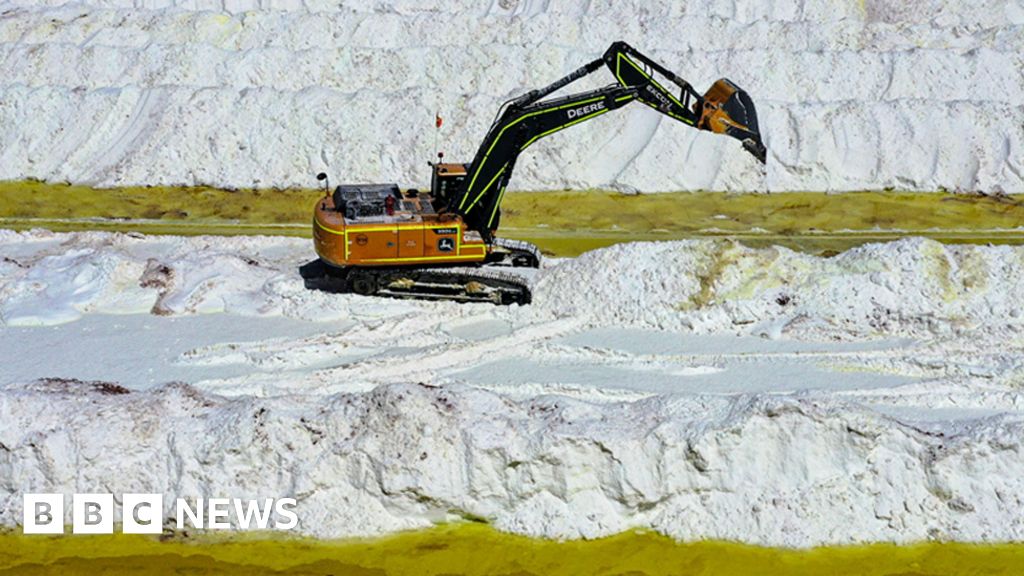…
As Chinese companies have increased their overseas mining operations, allegations of problems caused by these projects have steadily risen.
The Business and Human Rights Resource Centre, an NGO, says such troubles are “not unique to Chinese mining” but last year it published a report listing 102 allegations made against Chinese companies involved in extracting critical minerals, ranging from violations of the rights of local communities to damage to ecosystems and unsafe working conditions.
These allegations dated from 2021 and 2022. The BBC has counted more than 40 further allegations that were made in 2023, and reported by NGOs or in the media.



The same solution that’s been around since 1879… the electric train.
There is no environmentally friendly way to keep our current mass transit system, which is currently just everyone over the age of 16 having a car.
The problem is simple, the solution is simple, the only thing that makes it a difficult problem is because we don’t have an economic incentive to shift capital away from private ownership.
First of all, electric trains require batteries, which require these minerals. Secondly, so does every electronic device in your house for other reasons.
So I have no idea why you think electric trains will do anything about mining conflict minerals.
Not trying to nitpick your general point, but electric trains can get power from an electrified third rail or overhead lines.
Generally not if they are going across the country though.
You have no idea what you are talking about… Electric trains predate the combustion engine and were used to transport trains all over the world. You are pretending as if it’s difficult to hang a wire over train tracks, or electrify a track.
Battery powered trains are largely a failure, as you are using most of the output of the battery to move the battery. They typically only have about a 100k range and are only employed in cities as local transit.
Every high-speed train on the planet is run on electrified rail, a third of all railways are electrified, this including the entirety of the trans Siberian railway.
Please explain:
https://www.smithsonianmag.com/smart-news/first-battery-powered-trains-europe-180982468/
https://www.trains.com/trn/news-reviews/news-wire/first-of-many-battery-trains-enter-service-in-germany/
Also, stringing cables across vast distances where there are no cables is not some sort of simple task like you make it out to be.
Maybe read the article you posted as evidence? It’s not a battery powered train, it’s just an electric train that has a small battery to reap back a little energy conservation from braking. The battery is largely just a marketing tool used to sell it to politicians.
“They are designed to replace diesel multiple units and operate as regular electric trains when running on electrified lines”
The same train system.
Harder than laying rail lines across the same vast distances…? Or harder than replacing every engine with a battery power, and maintaining those complicated engines and replacing those consumable batteries?
Again, you obviously have no knowledge about trains. Why are you so set on spreading misinformation about them?
Harder than laying rail lines that already exist? Yes. Why wouldn’t it be? Or do all new tracks also need to be built?
What do you think is harder, leveling, elevating, compacting, laying down ties, and then laying and welding kilometers of the rail…or you just digging a hole every 200 yards and hanging wire?
We are already doing things a lot more difficult by simply laying down track, electrifying it isn’t going to be a problem. If the Russians could electrify rail all the way to the Pacific +50 years ago, I think we can manage.
No, you could hang wire relatively easily and cheaply. But electrifying the rail would be the best solution. Something you could easily do while doing track maintenance over time.
The rails we utilize have to be regularly replaced anyways, we aren’t running on the same track we laid down a hundred years ago.
This is not a difficult material problem, this is how the majority of large nations handle mass transportation. America is just more concerned with protecting their car and airplane industry than they care about logistics or about solving climate change.
Electric trains don’t run on batteries… It’s through an electrified rail, or overhead wiring. Do you think they had batteries in the 1800s that were energy dense enough to push a cast iron train?
https://www.hitachirail.com/products-and-solutions/battery-powered-trains/
https://www.smithsonianmag.com/smart-news/first-battery-powered-trains-europe-180982468/
etc.
Those are the same electrified train… The battery only has 10k of range. Meaning it’s just a gimmick for green wash marketing.
Ect.
Hum… Your version of electric trains do not need electric motors? It must be a really nice design, have you patented it already?
What does an electric motor have to do with batteries or fossil fuels?
Rare earth elements (the ones people are blaming here) have nothing to do with batteries.
The topic of the conversation has been over rare earth elements specific to battery production…
The only rare earth elements in any electric motor are neodymium, and trains typically don’t even have those. Electromagnetic is more dynamic as you can easily manipulate the magnetic current.